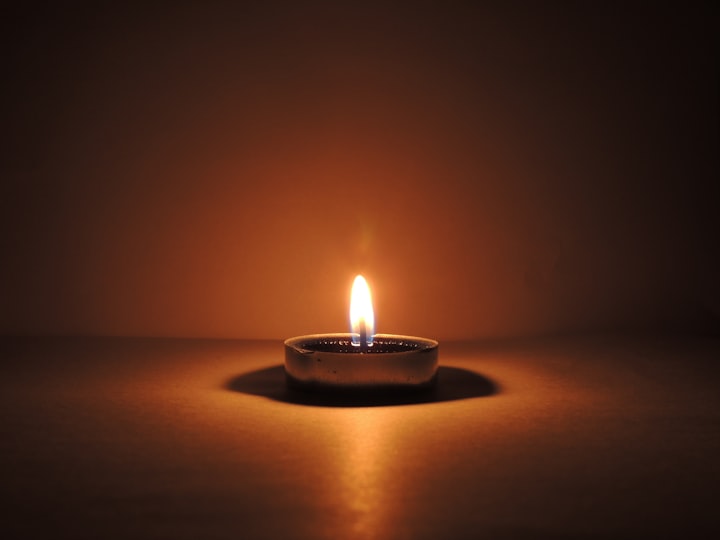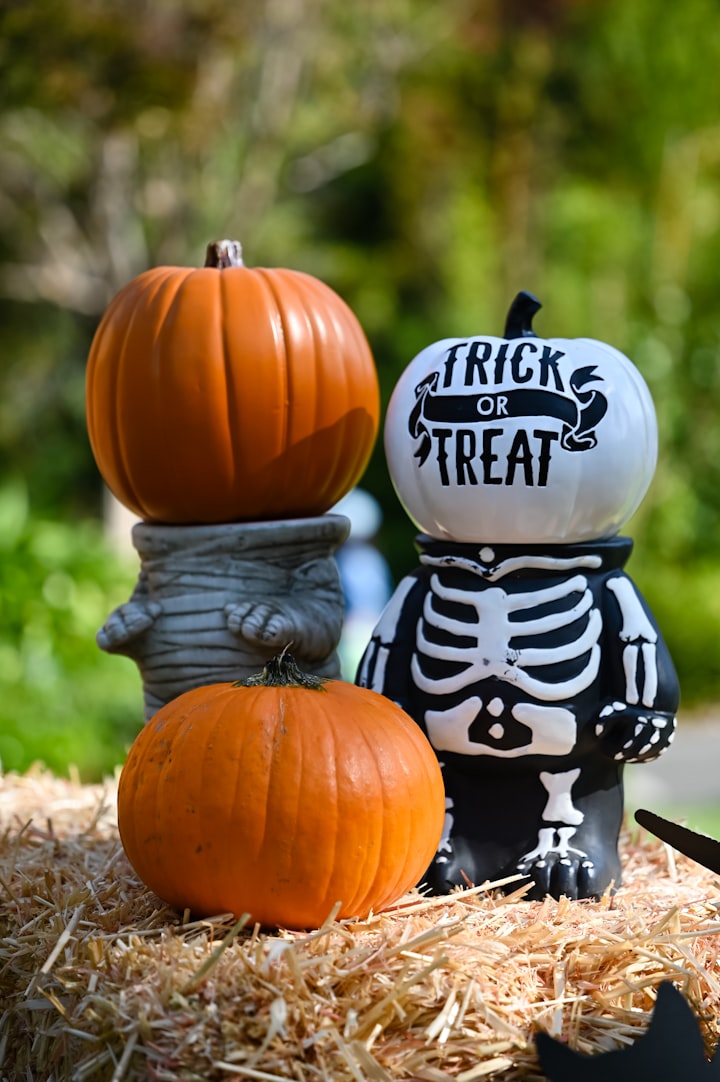The Candle Flickers
... and the demon stirs in the dark
The cabin in the woods had been abandoned for years, but one night, a candle burned in the window. It draws me in. Like a moth, I rush through the forest, not flying, not running, but a mix of both. I’m weak, only shadows remain of what I once was. The light flickers through the dilapidated shutters, beckoning me, calling me. It is not just the flame in the candle what entices, but the hand that ignited it. Life is near. I desire it, its warmth, its vitality. I cannot escape my nature.
***
The raspy, hoarse voice floats in the air, muffled by the thick wooden door, “Nettie, please, open the door. Let me in, Hun.”
It had taken them ages to choose that door, back when their ambitions were still intact. Tom, her husband, always said it was her who’d chosen it, and he wasn’t sure if the door suited the cabin or not, or if it was beautiful or monstruous. What had once been a walnut tree had morphed into flowy water lilies, wood turned into ephemeral stems that seemed to disappear into eternity while dancing unbound. Natural angles and living fibers had been forced into elegant curves, or brutalized into ascetic lines, until all semblance of nature had been replaced by artificial representation. There was darkness inside the craftsman; he must have had a deep understanding of pain to produce a thing of such beauty.
Tom had come back in the middle of the night, moments after she lit the candle. She had heard noises in the bushes, but no footsteps. It is now morning. Nettie looks again through the peephole. It looks like Tom. The night before, she had almost opened the door, but then she remembered the words on the prophecies, and changed her mind. The church released the secret prophecies of Our Lady of Oronio, right after the nuclear winter had started, when they still had electricity. People discussed and argued with each other about the veracity, authenticity, and trustworthiness of the prophecies, oblivious to the world being dismantled around their heads.
With the sunlight filtering through the holes in the roof, she thinks the sultry voice sounds like his. Should I open and let him in? Tom left what, two days ago? No, it must be three now. He had gone out searching for water. He might be an imitation, but he—no, not he, “it”—might not be her husband. “It” might not be Tom. The prophecies warned that the demons would come, dressed as their loved ones, wearing their skin, in order to gain entrance. God, I’m so thirsty. How long has it been since I last had something to drink? Three days? Four? I feel so lost, so confused. Time seems to be marching differently, like months might pass in an hour, and seconds might take as long as a week. She comes in and out of consciousness.
“What’s the secret word, Tom?” she asks. But there’s only silence. The sun is high in the sky, it might be midday. She looks through the peephole again. His head hangs low, as if defeated. He stares at his hands.
“I don’t—I don’t remember, Nettie. Please open the door. It is awful out here. Let me in!” Just as last night. Just as early this morning. He doesn’t remember. She doesn’t believe him.
She grabs the bowl by the door. They had prepared the mix as instructed by the prophecies: equal parts of ash and salt, always with a source of light over it. It had sounded ridiculously pagan to her, but they had complied. She pours the mix on the threshold. He knocks, loudly, the door shakes. He—no, “it”—“it” is not her husband.
Standing by the door, she leans back against the cold wall. Long ago she had chosen a palette of creams, browns, and soft greens to decorate their cabin. The cabin had belonged to Tom’s father, who loved to hunt. She had stripped the crude cabin of the man’s presence and had transformed the space into a rustic but very chic and expensive-looking get-away. Now it was all washed up and covered in mold and dust. She wishes she had surrounded herself with livelier colors. Perhaps they would’ve lent her the strength she now needs. With her bare foot, she pushes further the mix of salt and ashes tighter into the crack underneath the door. She begs the mix holds “it” away.
The door trembles as he kicks non-stop for a couple of hours. She doesn’t dare move, she just prays, silently. Each time he launches another assault, she prays faster. She’s afraid that if she lets her guard down, the demon will infiltrate using the tiniest of fissures he might find either in the salt and ash barrier or in her soul.
Suddenly, he goes quiet. The silence is deafening, palpable, eerie. She wasn’t aware of the noise pollution by electricity until it went out. Most people, she included, always thought that civilization would end with one big bang, and done, that was that. But no; they boiled themselves slowly in the pot they so carefully prepared.
She doesn’t know when the end began. Most people pointed to the flu of ‘91, but even before that, human life was worthless while constant progress, expansion and development kept them chasing their own tails. She didn’t grasp back then that someone would have to fall for the rest of them to rise. Someone would have to starve for the rest of them to fatten up, to accumulate. Someone, somewhere, something would have to give. Diamonds enslaved, oil mutilated and gold acquired paradise for a few, while weapons became a symbol for freedom. Initially, they brushed it of as just a cold. The sniffles. A bit flu-ey, nothing to worry about. And as the coffins started piling at cemetery gates, and later overwhelmed crematoriums, they watched in horror, wondering how a simple, little cold could do that. By the time the bodies were simply abandoned outside—if someone carried them out—or people died on the streets, they were used to the smell of rotting flesh. Once a week an official-looking vehicle would come by, and bio-secure suited-up workers would make a heap of cadavers, and nude from both wood and ritual, they would burn the lot. For a few days the smell would change from decay to charred meat.
They fled to the countryside, to the cabin in the woods. They had stopped using it. The place was solitary, in the middle of nowhere, and it rained all the time in that part of the country. When they first got married, they had refurbished it with care and love, but soon grew bored of the place, so they stopped coming altogether. There are only so many times you can make love in front of the fireplace, only so many times you can play cards and only so many times you can be isolated with just your spouse for company. Humidity, black mold, and neglect took over fairly fast.
The sun starts going down. It will be dark soon. She checks through the peephole, and Tom is still there, now sitting calmly in the middle of the entrance. His lovely blonde curls and bright blue eyes are still as she remembers them. He has the same undereye black circles, and his body shows the same weight loss it did a few days ago. Is he indeed my husband? Have I made a terrible mistake by leaving him outside? But if I let him in and he’s not Tom, a lot more than my life is at risk. My soul and eternity are at stake.
“Tom? What’s the safe word?” she asks softly.
He lifts his head up, alert, “I don’t remember Nettie, just let me in. I brought water, see?” he stands up and shows her a container. “You need to drink, or you’ll die. It’s been too long, just let me in.”
I can’t. She steps away from the door and that initiates another attack. She goes to the dining table, grabs the candle, and lights it. Her last candle: less than a quarter of it remains. The ornate candleholder won’t make it last one second longer, and once it’s out, she will be at the mercy of the darkness and its dwellers. They will take over.
She returns to the spot by the door and places the candle on the floor. The hammering on the door diminishes slightly. She sits next to it. Outside the halo of the candlelight, the night envelopes the world.
The market crashed a few months later, and then food shortages followed. Soon after war broke out, and those who had beaten the disease, hunger, and tremors, against all odds, were confined together and, like sardines, wrapped in metal and sent off to fight. With the nuclear winter, the sniffles came back, worse than before.
Silence returns. Sitting with her back firmly against the wall, she closes her eyes for a moment, only for a moment.
A loud bang wakes Nettie up. She licks her parched lips, to no avail; they remain as cracked and sore as they were seconds before. Her throat burns and she knows there will be no respite. She listens carefully and moves closer to the door. The candle wavers, it is almost spent. She hears nothing and wonders if the loud bang was part of a dream. How long was I asleep?
“Nettie, baby, please open the door,” there’s sweetness and warmth in his voice, but he—no, “it” doesn’t fool her.
Her mouth motions the well-rehearsed ‘prayer for my soul’.
“Please, Hun, please, open the door,” there is urgency in his voice.
“It is not you; you are not Tom. I will never let you in.”
He pummels at the door, screaming her name over and over. She hardly has any strength left, but she keeps praying quietly. The candle flickers, the light dims, the demon stirs on the other side, scratching, rasping. The candle goes out, and a frenetic laughter follows: a sign of victory, of triumph.
The barrier of salt and ash won’t hold much longer. Without light, the mix won’t work, and the sun is still hours away. She blinks in the darkness a couple of times, and then, she’s done. Suddenly she feels like she’s standing in front of a mirror and sees her dull eyes staring back at her. Gently, she takes her hands and squeeze them. They are cold and lifeless, and the tips of her fingers have changed from purple to almost black. It is hard to let go, but she must, it is not a choice. She waits for a bright light to appear, and yet, she remains surrounded by blackness. She squeezes her hand lovingly once more, and then bereft she walks away, leaving her flesh behind, devoid of any life.
The End.
If you like what you read, please consider supporting me in my creative journey by donating, pledging or sharing a link to my story with your loved ones. Thank you!
About the Creator
B.M. Whitton
B. M. Whitton was born in Rosario, Santa Fe, Argentina but has made sunny Queensland her home. Her stories contain elements of fantasy, black comedy, history and magic realism, and give a voice to those who don't have one.







Comments
There are no comments for this story
Be the first to respond and start the conversation.